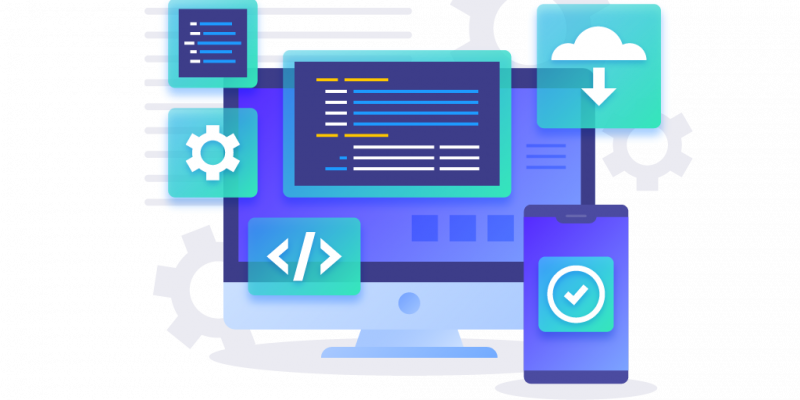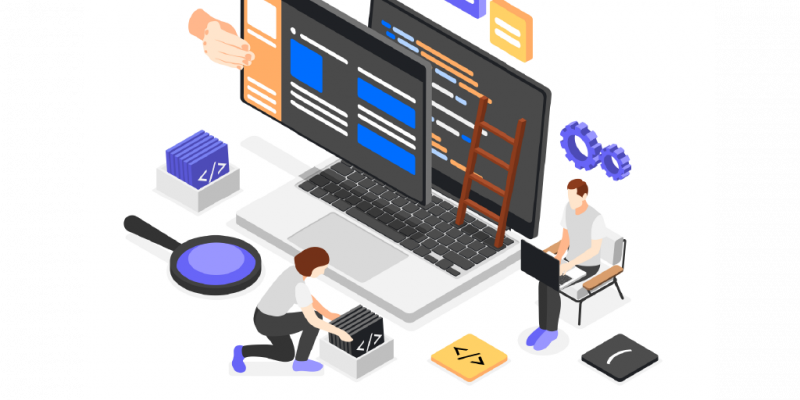Are you looking for solutions that meet your unique needs?
Experion’s bespoke software development services provide tailored solutions that empower businesses with technology designed to meet their specific requirements and future goals. Consider a growing business facing the challenge of managing diverse data sources and operational workflows efficiently. They need a software solution that can unify data streams, automate routine tasks, and provide insightful analytics to drive strategic decisions. Yes, software plays a pivotal role in driving business efficiency, innovation, and customer satisfaction. Bespoke software development emerges as the ideal approach, offering tailored solutions that align closely with their unique business processes and scalability requirements. Software development, the process of creating software applications, encompasses a vast spectrum of approaches. One powerful approach gaining significant traction is bespoke software development.
What is Bespoke Software Development?
Bespoke software development goes beyond a simple definition. Bespoke software development is the creation of custom-built software solutions designed to meet the specific needs and requirements of a particular organization or individual. Just like a bespoke suit is meticulously tailored to fit a person perfectly, bespoke software caters precisely to unique workflows, challenges, and goals. It’s a collaborative process that translates your vision into a powerful software solution. Bespoke software, also known as custom software, is the antithesis of off-the-shelf software. It’s crafted from the ground up to address your organization’s specific needs. This tailored approach ensures a perfect fit for your workflows, data structures, user interface preferences, and integration requirements.
As user expectations continue to rise, bespoke software development is increasingly prioritizing intuitive, user-friendly interfaces to ensure smooth adoption. Modern practices also emphasize seamless integration with existing software and tools, thereby streamlining operational workflows. This approach is particularly gaining momentum in sectors such as finance, healthcare, and manufacturing, where unique operational needs necessitate specialized software solutions. Additionally, the advent of low-code development platforms has empowered businesses to create customized applications with minimal coding expertise, although complex projects still benefit from the expertise of experienced developers.
Why is Bespoke Software Development Important?
By investing in bespoke software development, you gain a powerful tool that directly translates to a competitive advantage, operational excellence, and a future-proof foundation for your business success. In a world of off-the-shelf software with generic features, bespoke development offers compelling advantages.
Benefits of Bespoke Software Development

Customization to Meet Specific Business Needs:
- Tailored Integration: Bespoke software aligns closely with your business’s workflows, adapting to your unique operational requirements without the need for extensive process adjustments.
- User-Centric Design: Custom user interfaces and functionalities are designed to reflect your organization’s terminology, processes, and user preferences, enhancing usability and adoption rates.
- Optimized Data Handling: Efficient handling of data ensures that your software not only meets immediate needs but also supports future growth and evolving data demands.
Scalability and Flexibility
- Built for Growth: Bespoke solutions are designed with scalability in mind, allowing for easy expansion, integration of new features, and adaptation to changing business environments.
- Future-Proofing: Flexibility ensures that your software investment remains relevant and valuable over time, accommodating technological advancements and evolving market demands.
- Agility in Operations: Agile development methodologies enable quick adjustments and updates, ensuring that your software evolves alongside your business without disruptions.
Enhanced Efficiency and Productivity
- Automation of Processes: Bespoke software automates routine tasks, reducing manual errors and streamlining operations for increased efficiency.
- Resource Optimization : By freeing up resources from repetitive tasks, employees can focus on strategic initiatives and value-added activities that drive business growth.
- Operational Streamlining: Custom workflows and integrations eliminate inefficiencies, resulting in faster turnaround times and improved operational performance.
Competitive Advantage
- Innovative Solutions: Addressing specific business challenges with tailored solutions allows you to differentiate your offerings in competitive markets.
- Customer-Centric Approach : Enhancing customer experiences through personalized solutions can lead to higher customer satisfaction and loyalty..
- Market Leadership : By leveraging bespoke software to innovate and meet niche market demands, organizations can establish themselves as industry leaders in innovation and efficiency.
Improved Security and Compliance
- Tailored Security Measures: Bespoke software enables customized security protocols that address specific organizational needs and compliance requirements.
- Data Protection : Enhanced security features, such as advanced encryption and access controls, safeguard sensitive data from internal and external threats.
- Regulatory Compliance : Built-in compliance frameworks ensure adherence to industry regulations and standards, minimizing legal risks and reputational damage.
Industry Trends
The bespoke software development market is experiencing significant growth, driven by several factors.
- Addressing Complex Business Needs: As businesses become more complex, their needs for specialized software solutions rise. Bespoke development offers a way to meet those evolving requirements.
- Enhancing Customer Experience : Customers today demand personalized experiences. Bespoke software allows businesses to create software that caters to their customer’s specific needs and preferences.
- Leveraging Modern Development Tools : The constant evolution of programming languages, frameworks, and development tools makes it easier and more cost-effective to develop customized software.
Key Stages in Bespoke Software Development

The bespoke development process typically involves several stages:
- Requirement Gathering: A thorough analysis of your business needs, challenges, and desired outcomes.
- System Design and Architecture : Defining the software’s functionality, user interface, data structures, and integration points.
- Development and Coding : Building the software according to the agreed-upon design specifications.
- Testing and Quality Assurance : Rigorous testing to ensure the software meets all requirements and functions flawlessly.
- Deployment and Training : Implementing the software in your environment and providing user training.
- Ongoing Maintenance and Support : Addressing bugs, enhancing features, and providing ongoing support as your needs evolve.
However, bespoke software development also comes with considerations:
- Cost : While the initial investment for bespoke development might be higher than off-the-shelf options, the long-term benefits are considerable.
- Time : Development takes time, and the timeframe can vary depending on the complexity of the project.
- Project Management: Close collaboration and clear communication are essential for successful bespoke software development.
Considering these factors, bespoke development is ideal for businesses with:
- Unique processes and workflows that off-the-shelf software can’t accommodate.
- Specific integration needs that require custom software to connect with existing systems.
- A strong desire for a competitive advantage through innovative software solutions.
- The resources to invest upfront.
Bespoke vs. Off-the-Shelf Software: Making the Right Choice

Choosing the ideal software solution hinges on understanding the distinct strengths and weaknesses of bespoke and off-the-shelf options:
Bespoke Software
Advantages
- Customization: Tailored to your specific needs, workflows, and data structures.
- Scalability and Flexibility: Designed to grow alongside your business and adapt to changing requirements.
- Enhanced Efficiency and Productivity: Streamlines processes and eliminates manual tasks, boosting productivity.
- Competitive Advantage: Addresses unique business challenges and differentiates you from competitors.
- Improved Security: Customizable security measures address your specific security concerns.
Disadvantages
Considering these factors, bespoke development is ideal for businesses with:
- Unique processes and workflows that off-the-shelf software can’t accommodate.
- Specific integration needs that require custom software to connect with existing systems.
- A strong desire for a competitive advantage through innovative software solutions.
- The resources to invest upfront
Off-the-Shelf Software
Choosing the ideal software solution hinges on understanding the distinct strengths and weaknesses of bespoke and off-the-shelf options:
Advantages:
- Cost-Effective: Typically, lower upfront cost compared to bespoke development.
- Faster Deployment: Often readily available or can be implemented quickly.
- Ease of Use: May have a user-friendly interface and pre-built features.
Disadvantages:
- Limited Customization: May not cater to your specific workflows and needs, requiring adaptations.
- Scalability Limitations: May not adapt readily to growth or changing requirements.
- Generic Features: May have features that are irrelevant to your business.
- Security Concerns: Security features may be limited, potentially increasing risk.
Choosing the Right Path
Consider these factors to make an informed decision:
- Uniqueness of Needs: If your business processes are highly specific, bespoke development offers a better fit.
- Budget and Time Constraints: If resources are limited and a quick solution is needed, off-the-shelf software might be suitable.
- Scalability Requirements: If your business is poised for growth, bespoke development can be a future-proof investment.
- Security Concerns: If robust security is paramount, a tailored bespoke solution offers an advantage.
Choosing Experion’s bespoke software over off-the-shelf solutions means getting a custom-built system tailored to your unique business needs, offering greater flexibility, scalability, and long-term value.
Bespoke Software Development Process

Transforming your vision into a powerful software solution requires a well-defined development process. Here’s a breakdown of the key stages involved in bespoke software development:
Initial Consultation and Requirement Gathering:
This is the foundation upon which the entire project rests. Here, you’ll collaborate with the development team to:
- Define your business goals and objectives.
- Identify specific challenges and pain points you aim to address.
- Outline desired functionalities and features for the software.
- Discuss integration needs with existing systems and tools.
- Establish project timelines and budget constraints.
Planning and Designing the Software
- With a clear understanding of your requirements, the development team will:
- Create a detailed project plan outlining deliverables, milestones, and timelines.
- Design the software architecture, ensuring scalability, security, and efficient data flow.
- Develop a user interface (UI) prototype that reflects your desired user experience (UX).
Development and Coding
The development team brings the design to life by:
- Implementing the software using appropriate programming languages and frameworks.
- Adhering to best practices for clean and maintainable code.
- Conducting regular code reviews to ensure quality and adherence to specifications.
Testing and Quality Assurance (QA)
Rigorous testing is crucial for a successful software launch. This phase involves:
- Unit Testing: Verifying that individual code modules function as intended.
- Integration Testing: Ensuring different components of the software work seamlessly together.
- System Testing: Testing the overall functionality of the software against defined requirements.
- User Acceptance Testing (UAT): Allowing you and your team to test the software and provide feedback before deployment.
Deployment and Implementation
Once the software has passed all testing phases, it’s time to roll it out:
- Deployment Strategy: Choosing the most appropriate deployment method (cloud, on-premise, etc.).
- User Training : Providing user training to ensure smooth adoption of the new software.
- Data Migration (if necessary): Migrating data from existing systems to the new software.
Ongoing Support and Maintenance
The software development journey doesn’t end with deployment. Ongoing support is essential to:
-
-
- Address any bugs or issues that may arise.
- Implement new features based on changing requirements.
- Provide technical support to users as needed.
- Maintain the software’s security posture through updates and patches.
-
By following these well-defined stages and fostering a collaborative relationship with the development team, you can translate your vision into a bespoke software solution that empowers your business to thrive.
Challenges of Bespoke Software Development
While bespoke software development offers the ultimate fit for your specific needs, it’s important to be aware of the inherent challenges involved. Unlike off-the-shelf solutions that provide a quicker and potentially cheaper entry point, bespoke development requires a more in-depth commitment. Let’s delve into some of the key challenges to consider
Higher Initial Costs
Bespoke software development carries a larger upfront price tag compared to commercially available, pre-built solutions. Here’s a breakdown of the cost factors:
- Development Team: Assembling a skilled team of developers, designers, and project managers with the specific expertise required for your project is a significant investment. Their expertise and experience directly impact the quality and efficiency of the development process.
- Project Management: Effective project management ensures the project stays on track, within budget, and meets deadlines. This includes tasks like resource allocation, risk mitigation, and communication management.
- Technology Stack: Depending on the complexity of your project, you might need to invest in new technologies or frameworks. While open-source options exist, integrating them or acquiring licenses for specific tools can add to the initial cost.
Longer Development Time
Building software from scratch is a time-intensive process. Unlike pre-built options that offer a quicker implementation, bespoke development requires several stages:
- Requirements Gathering: This initial phase involves meticulously understanding your specific needs, functionalities, and workflows. This includes conducting interviews, workshops, and user research to ensure a clear vision for the final product.
- Design and Prototyping: Based on the gathered requirements, the development team translates them into a user interface (UI) design and potentially builds prototypes to allow for user feedback and refinement before coding begins.
- Development and Testing: This stage involves writing code, integrating various components, and rigorously testing the software for functionality, performance, and security.
- Deployment and Maintenance: Once the software is thoroughly tested, it’s deployed into your environment. Bespoke development also requires ongoing maintenance to address bugs, implement new features, and adapt to changing technologies.
Need for Clear Communication and Collaboration
The success of bespoke software development hinges on a strong foundation of clear communication and collaboration between your team and the development team. Here’s why effective communication is crucial:
-
-
- Clearly Defined Requirements: Having well-defined and documented requirements at the outset is essential. This minimizes ambiguity and ensures the development team is building the software you truly need.
- Consistent Information Flow: Maintaining open communication channels throughout the development process allows for real-time feedback and course correction as needed.
- Open Discussions: Regular discussions and progress updates foster transparency and a sense of shared ownership between all stakeholders. This ensures the final product reflects your vision and addresses any potential concerns early on.
-
How Experion Helps in Your Bespoke Software Development
At Experion, we understand that each business is unique and requires tailored software solutions to achieve its goals. Here’s how we assist you in your bespoke software development journey:
In-Depth Requirement Analysis
We begin by thoroughly analyzing your business needs and objectives. Our team collaborates with you to understand your processes, challenges, and goals, ensuring the software we create aligns seamlessly with your requirements.
Custom Solutions
Our expertise lies in creating custom software solutions designed specifically for your business. Whether you need a complex enterprise application or a simple tool to streamline your operations, we craft software that fits seamlessly into your existing systems and processes.
Expert Development Team
Our development team comprises experienced professionals skilled in the latest technologies and methodologies. We leverage modern programming languages, frameworks, and tools to build robust, scalable, and efficient software solutions.
Agile Development Process
Our development process is agile, promoting flexibility and adaptability. This method helps us incorporate changes and feedback, ensuring the final product fits your evolving requirements.
Quality Assurance
Quality is at the forefront of our development process. Our dedicated QA team rigorously tests the software to ensure it meets the highest standards of performance, security, and usability.
Support and Maintenance
Our commitment to your success continues well beyond the delivery of the software. We provide ongoing support and maintenance to ensure your software remains up-to-date and continues to meet your business needs.
Focus on Long-Term Value
While bespoke development can involve a higher upfront cost, we focus on delivering long-term value. Our solutions are designed to grow with your business, providing a solid return on investment over time.
Key Takeaways
- Bespoke software seamlessly integrates with existing systems, optimizing workflow efficiency.
- Custom solutions address unique business challenges, providing a significant marketplace advantage.
- Tailored software can grow with your business, accommodating future needs.
- Automates routine tasks, freeing up employees for higher-value activities.
- Provides an interface tailored to specific user needs, boosting satisfaction and adoption.
- Bespoke development offers enhanced security measures tailored to specific requirements.
- Custom software eliminates the need for ongoing licensing fees of off-the-shelf solutions.
- Rigorous testing ensures the software meets all requirements and functions flawlessly.
- Bespoke software enhances customer experience by catering to specific preferences.
- Allows businesses to leverage modern development tools for cost-effective solutions.
- Ongoing support and maintenance to keep the software up-to-date and efficient.
- Custom solutions can address complex business needs that generic software cannot.
- Tailored software provides a solid return on investment over time.
- Effective project management and collaboration ensure successful bespoke development.
- Bespoke development fosters long-term value, supporting business growth and evolution.
With Experion, you gain a trusted partner dedicated to creating bespoke software solutions that drive your business forward. Let us help you transform your unique requirements into powerful, customized software.

